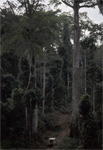By John O. Niles, special to mongabay.com
…in 2005, a small group of countries changed everything. Papua New Guinea teamed up with Costa Rica and a handful of other countries to make a formal plea to the United Nations. Their request was simple—if developing countries can credibly reduce rates of deforestation and the associated CO2 emissions, the countries should get paid. This band of countries, organized as the Coalition for Rainforest Nations, was even more specific. They asserted that tropical nations should get lucrative carbon credits for each ton of CO2 that otherwise would have been emitted because of deforestation. The global market for carbon credits was worth tens of billions of dollars, so tying rainforest protection to carbon finance would raise vast new sums to conserve tropical forests. Since almost 20 percent of greenhouse gas emissions are from tropical land-use change, and with growing concern about global warming, other countries began to listen.
Since 2005, the concept of paying countries to conserve their forests and reduce global warming has been dubbed by diplomats as reducing emissions from deforestation in developing countries, or REDD. REDD is a bold and evolving plan to radically slow the pace of CO2 emissions by offering hefty incentives for developing countries to stem deforestation. Instead of a couple hundred million dollars per year in conservation charity, billions of dollars in carbon credits could be spent to curtail logging, stop agriculture expansion, or in other ways prevent forests from getting knocked down or set on fire. …
A New Idea to Save Tropical Forests Takes Flight




No comments:
Post a Comment